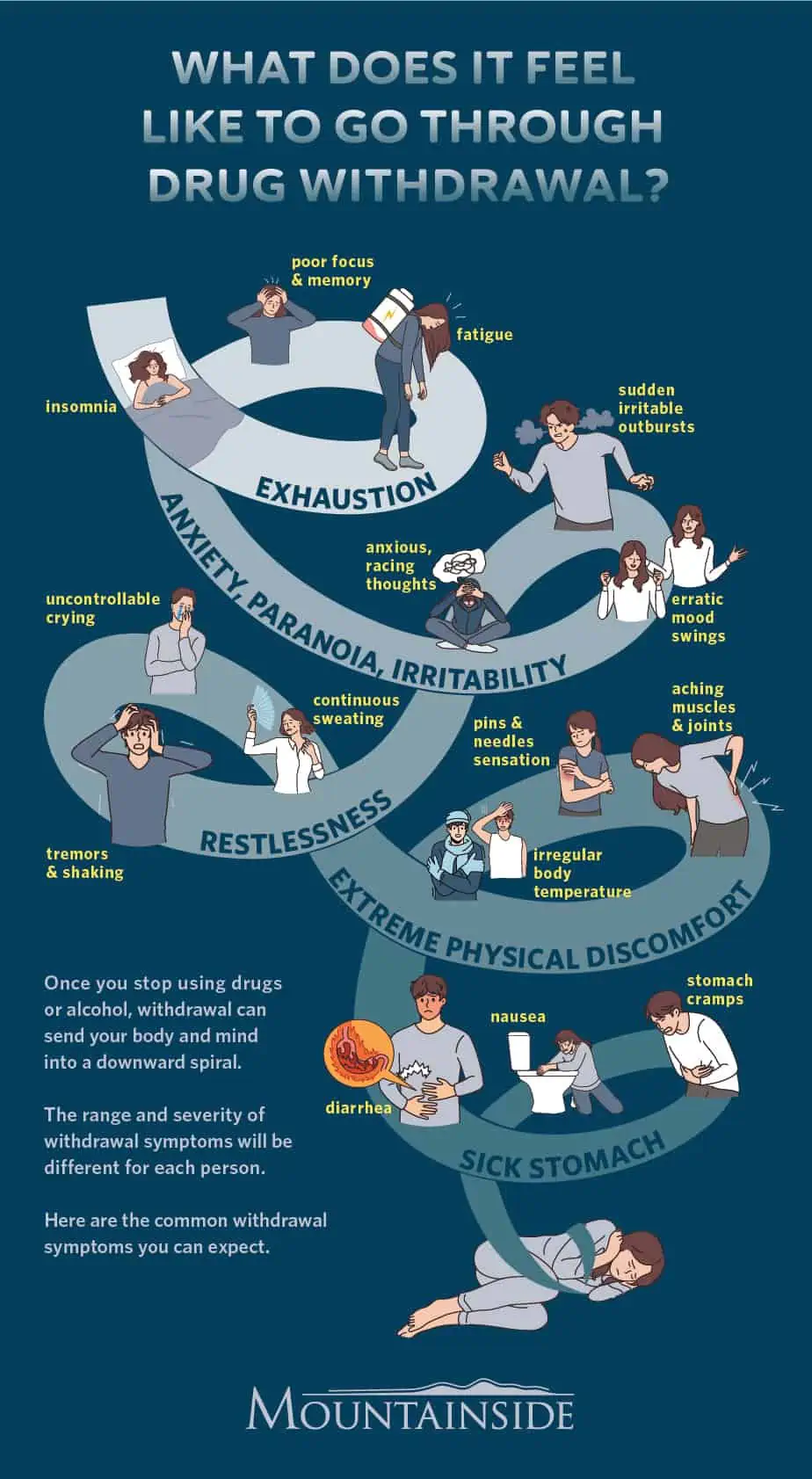When it comes to overcoming drug addiction, one of the most significant challenges individuals face is the process of drug withdrawal, which refers to the set of symptoms that the body experiences when a drug addict suddenly stops or reduces their chronic use of drugs or alcohol. These withdrawal symptoms can vary in type and severity depending on the substance being used and the duration of drug use. It is important to understand what drug withdrawal looks like and how it affects the body to navigate this critical phase of recovery successfully.
What Causes Drug Withdrawal Symptoms?
To comprehend drug withdrawal symptoms and drug dependence, it is important to understand how drugs interact with the brain and body. Different types of drugs produce varying effects on brain chemistry, leading to the development of physical dependence and tolerance. The body adapts to the presence of these substances, and when drug use is abruptly stopped, the body reacts to the sudden absence of drugs, resulting in withdrawal symptoms.
For instance, opioids like heroin and painkillers affect the brain’s dopamine levels, which are responsible for feelings of happiness and euphoria. Prolonged opioid use leads to the brain relying on opioids for dopamine production, and when drug use is discontinued, dopamine levels drop significantly, causing symptoms such as anxiety and depression.
What Are Withdrawal Symptoms?
Drug withdrawal symptoms can manifest in a variety of ways, depending on the type of drug being used. The symptoms experienced during withdrawal are often the opposite of the desired effects of the drug. Here are some common general addiction withdrawal symptoms:
Exhaustion
We’ve all felt tired before, but withdrawal wipes all the energy out of you. You will likely feel so fatigued that you will be unable to complete even the most minor tasks. And yet, because of the other withdrawal symptoms that you are likely to experience, you will probably be unable to get any rest.
Extreme Physical Discomfort
Despite significantly low levels of energy, your body will feel like it’s fighting itself, perpetuating your exhaustion even more. Drug withdrawal causes the body to feel intense pain. You may even notice that it feels as though your body is burning—some say it feels like their body is on fire. Your eyes will burn, and your nose will run. It will feel like your body is giving up. And on top of throbbing soreness, you may experience a pins-and-needles sensation prickling throughout your entire body. You may also experience radical, unpredictable shifts in body temperature. At one moment, you may be intensely warm and sweating, and a few moments later, you may feel severely cold and begin shivering.
Sick Stomach
As your body removes the remnants of the substance, your stomach will be turning. Anticipate feeling terribly nauseous. As the abdominal discomfort persists, you may vomit repeatedly. It is also common to experience acute diarrhea.
Anxiety, Paranoia, and Irritability
Unfortunately, physical symptoms are not the only signs of drug withdrawal at play. You may feel heightened levels of anxiety while going through withdrawal. Your mind may go into overdrive to the point where you feel paranoid. As the stress continues to build, you may feel irritable or moody.
Restlessness
Between the extreme mental and physical discomfort and your exhaustion, you may find that you cannot stay still for even a moment. Your body may shake beyond your control. You may even experience sleeplessness, and lots of tossing and turning, as you cannot sleep off the pain.
Drug withdrawal looks different depending on the drug or substance. It is important not to go “cold turkey” and instead seek medical attention, particularly with alcohol, benzodiazepines, and opiates. Going cold turkey, in some cases, can be life-threatening.
Treating Drug Withdrawal Symptoms
While the prospect of drug withdrawal symptoms can be a barrier to quitting, there are effective ways to manage and treat them. Seeking addiction treatment, such as drug detox programs, can provide the necessary support and medical intervention to ensure a successful recovery journey. While rare, with some drugs, you can die from withdrawal, such as alcohol and opiates, so medical detoxification is often necessary.
Drug detox programs focus on helping drug abusers navigate the withdrawal period safely and comfortably. Medical professionals utilize various interventions, including medication-assisted treatment, to alleviate withdrawal symptoms and provide relief. These programs prioritize the well-being and safety of individuals, mitigating the risks associated with acute withdrawal symptoms.
Drug withdrawal is a challenging but necessary phase in the journey toward recovery from drug addiction. Understanding the symptoms and effects of drug withdrawal is crucial for individuals seeking to overcome addiction. By seeking professional help and accessing appropriate addiction treatment programs, individuals can safely and effectively manage withdrawal symptoms, paving the way for a healthier and drug-free future.
How long do you feel withdrawal symptoms? It depends on the individual, length and duration of use, and the type of drug used. Typical detox programs last 3 to 10 days; however, mild symptoms can often be felt for weeks afterward.
If you or someone you know is struggling with drug addiction, it is important to reach out for help and support. Recovery is possible, and with the right resources and guidance, individuals can embark on a path to a better life. Remember, you are not alone, and there are dedicated professionals ready to assist you in your recovery journey.

If you or a loved one is struggling with addiction, Mountainside can help.
Click here or call (888) 833-4676 to speak with one of our addiction treatment experts.

 By
By 



